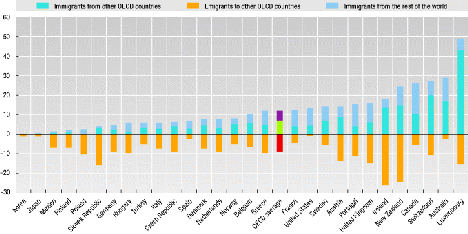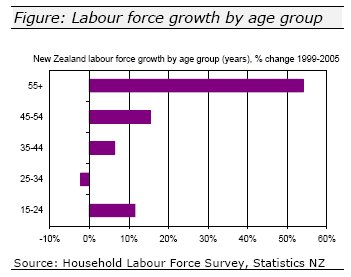



|
 |

|
| No.250 | 28 April 2006 | Essential Information on an Essential Issue |
of key events over the last few weeks. A QUARTER OF NZ GRADUATES LIVE OVERSEAS FREE-LOAN LURE TO BRING GRADUATES HOME HEALTH WORKERS MIGRATING FROM POOR TO RICH COUNTRIES JOB PROBATION BILL PROMPTS UNION TOUGH TALK FRENCH GOVT BACKS DOWN ON PROBATIONARY JOB LAW WORKING FOR FAMILIES PACKAGE DEBATED CHANGES TO TERTIARY EDUCATION FUNDING SKILLS SHORTAGE INCREASES WORKER MOBILITY PACIFIC MIGRANT WORKER PLAN STILL ALIVE INDUSTRY TRAINING NUMBERS UP DOL PREDICTS EASING OF LABOUR MARKET WORKER ACCOMMODATION SHORTAGE IN MARLBOROUGH LOW-PAID WORKERS ADVANTAGES OF EARLY CHILDHOOD INTERVENTIONS  LAST Letter
LAST Letter
NEXT Letter   Download this issue as a PDF file
Index to Features
25 March 2006Restaurant Brands, the company that franchises KFC, Pizza Hut and Starbucks, has signed a two-year agreement that will phase out youth minimum wage rates. The Australian Bureau of Statistics says the country has as many as 1.5 million people who would like a job, or to work more hours, and yet aren't counted in the official unemployment figures. 26 March 2006Advertised job vacancies fell in all NZ sectors (except IT) in February 2006 compared to February 2005. The latest Job Vacancy Monitor found the greatest decline in advertised vacancies was in Auckland with 34% fewer vacancies over the previous February. The Job Vacancy Monitor can be found here. 27 March 2006The French government's refusal to scrap its two-year youth employment probation legislation (CPE) has "plunged our country into an extremely grave crisis", according to the country's biggest student union. Continued opposition to the CPE takes a violent turn as youths rampage through Paris streets. More than 500,000 people march through Los Angeles in protest against proposed immigration laws which would make illegal immigration a criminal offence. However president George W. Bush asks Congress to allow illegal immigrants to stay if they take a job that legal American residents are unwilling to do. 28 March 2006Labour productivity in NZ has grown by an average of 2.6% per year since 1988 compared with 2.3% in Australia according to Statistics NZ. French trade unions begin a one-day national strike over the CPE fuelling fears of more violence. 30 March 2006The National Bank's monthly survey finds business confidence rebounding as the NZ$ drops in value. 50,000 of the most vulnerable families and children in NZ stand to be negatively affected by the scrapping of the Special Benefit, according to a report by the Wellington People's Centre. Working for Families: a Benefit Cut can be found here. 31 March 2006French President Jacques Chirac calls for an immediate "social conference" to try and negotiate a replacement for the unpopular CPE. 1 April 2006The government unrolls the next stage of the Working for Families economic reforms which will provide more money for most working families with children. The package also removes interest on most students loans and provides tax concessions for some NZers returning from living overseas. Other changes include increasing superannuation to 66.12% of the net average wage. The biggest change is the new In-Work Payment, which replaces child tax credits. Suspending interest on student loans will increase the amount of debt and the number of students taking out loans, according to official briefings. Voluntary repayments are expected to plummet. Nearly one-third of student loan repayments are currently made voluntarily but these are expected to drop by 80% now that the interest incentive is gone. This suggests that most graduates will have a slightly smaller debt but will be paying it off for longer. Many New Zealand universities and polytechnics are experiencing falling numbers of students primarily due to a drop in the number of foreign students. More than 300 jobs may be lost at Te Wananga o Aotearoa following a slump in student numbers. It is understood that the Te Awamutu head office is likely to take the brunt of the losses. Tuia Staff Union spokesperson Tank Gordon: "If we don't restructure there will be no wananga." 2 April 2006Women are still under-represented in leadership positions in NZ according to a survey of NZ Census of Women's participation by the Human Rights Commission. The report can be found here. The Equal Employment Opportunities Trust launches an on-line survey on how age affects people's experiences at work. Trust chief executive Dr. Philippa Reed says the research will help answer employers' questions about the needs and attitudes of older people. The survey, which will be live to the end of the month, can be found here. Otago University has a record number of enrolments from North Island students but a 2% fall in enrolments overall due to a reduction in international students. 8,800 northern hemisphere jobs are to be axed with the merger of the largest US phone-equipment maker Lucent to Paris-based Alcatel. Lucent CEO Patricia Russo, who eliminated 30,000 jobs at Lucent — is due to become the CEO of the combined company. 3 April 2006Minister of Labour Ruth Dyson launches a new tool kit as part of the Workplace Productivity Project. The kit, which contains information, case studies and a snapshot survey, is aimed at small to medium size businesses and will be distributed at seminars throughout the country. Migrants working in wealthy countries sent a record $NZ276 billion home to their families last year. The UN Economic and Social Commission for Asia and the Pacific says that in Bangladesh and the Philippines remittances exceeded official development aid and foreign direct investment. 4 April 2006Workers are confident about their job security but are doubtful of the chance of a pay rise or new job opportunities in the face of an economic downturn, according to the quarterly Westpac McDermott Miller Employment Confidence Index. The number of working-age migrants from Asia, South Africa and Britain collecting the unemployment benefit in NZ has fallen 77% over the last five years, over twice the rate that overall unemployment fell. Work & Income's Auckland migrant and refugee services manager Sally Ewer says the figures reflect the buoyant labour market but also the closer focus on would-be migrants with job offers by the Immigration Service. Manufacturing in China has allowed GPS products developer Navman to scale up production of new products very rapidly and then scale back again when sales drop. Chief operating officer Jim Doyle says if they tried to do that from NZ, Navman would have gotten a reputation of being a very "unstable employer". 5 April 2006Air NZ staff numbers are being cut by a further 8% as fuel costs rise. About 80 jobs will be lost at NZ Post in Auckland and Wellington as the economy slows and the state-owned enterprise begins to introduce new mail sorting technology. A chronic skills shortage is been blamed for hobbling Western Australia's economy. A report released by the Australian Bureau of Statistics says a dramatic fall in the state's economic growth in 2004-05 coincided with the height of the labour crisis. 6 April 2006Australia's jobless rate fell to 5% in March. Skilled migration to Australia could increase following the low unemployment figures released by the Australian Bureau of Statistics according to Treasurer Peter Costello. He says the government is focussed on training Australians but importing skills was an interim solution. Skills shortages in Australia may force the delay or dropping of many mining industry projects according the Association of Consulting Engineers Australia. On the back of a 25-year "incarceration binge", the US is now facing the problem of prisoners cycling back through prisons because of a lack of social supports. The Center for Employment Opportunities in New York City has addressed the relationship between work and crime through a highly structured programme of pre-employment training, immediate short-term transitional employment, and full-time job placement services. A report on the programme The Power of Work summary can be downloaded from here. 7 April 2006The National Equal Opportunities Network (NEON) launches a website focused on equal employment opportunities in NZ. The NEON site can be found here 8 April 2006The Auckland City Council plans to spend more than $15 million on an inner-city public housing project to provide housing for low-income workers. Auckland is one of only four local authorities in NZ without a public housing portfolio after the previous council sold it. Year-10 pupils from James Hargest College in Invercargill take to the streets to raise awareness of child labour in India and to fundraise to free a child from sweatshop labour. School boy James Foster says it costs $150 to free a child through World Vision and an additional $80 to place them in a "transit school" which is designed to bring a child up to speed with other children who are already at school. 9 April 2006Youth unemployment in West Africa is a "ticking bomb" for security according to a UN study. Special Representative of the Secretary General for West Africa Ahmedou Ould-Abdallah says unemployment feeds violence, and violence feeds unemployment. US unemployment drops to a four-and-a-half year low of 4.7%. 10 April 2006Over a third of employers say they will stop hiring teenagers if youth rates are abolished, according to a survey by the Northern Employers & Manufacturers Association. EMA employment services Manager David Lowe says the survey presents clear evidence that the high teenage unemployment rate of 12% will rise higher if the Bill becomes law. 96 police recruits from Britain arrive at the Royal NZ Police College at Porirua to begin 11 weeks conversion training as a pre-cursor to working as NZ police officers. 11 April 200627 jobs will be lost in Dunedin at Cottonsoft as the toilet tissue maker moves some of its manufacturing to Auckland. Telecom, NZ's largest listed company, is expected to cut jobs when it announces a plan to merge its fixed-line and mobile divisions. NZ may already be in a short-lived recession, according to the NZ Institute of Economic Research. 12 April 2006A Youth Transitions Service is launched in Manukau. Minister Social of Development and Employment David Benson-Pope says the service will provide career training, job seeking advice, information on educational opportunities and customised support for at-risk school leavers. A large number of illegal immigrants may be working on Auckland building sites according to the Labour Department following a blitz by inspectors of 110 sites in South and East Auckland. Master Builder Peter Burghout says a lot of builders are relying on skilled labour from other countries to fill gaps in the workforce. 80 jobs are to be lost in a St John Ambulance restructure. St John chief executive James Woods says the changes are aimed at reducing the duplication of jobs across the country. Front-line staff will not be affected. Easter ticket sales are up 22% for Intercity Coachlines. Extra services and staff have been put on for the Auckland to Wellington service to cope with increased demand. Chief Executive Malcolm Johns believes more people are opting for public transport as the cost of fuel increases. McDonalds fast food corporation in the US experiments with communications technology in which specialist order-takers are situated at a call centre rather than at a restaurant. French President Jacques Chirac scraps the young worker probationary law … "to end a situation of blockade … and for the sake of peace and order". 14 April 200672% of young people in Ontario, Canada aged 13-24 say their school guidance counsellors have not encouraged careers in the trades. A report by the Ontario chamber of commerce indicates that more than half of the province's trades people expect to retire within the next 15 years and there won't be enough qualified workers to replace them. 17 April 2006Builders from Germany, where the economy is in the doldrums, are arriving in numbers in the UK where there is a building boom. 18 April 2006The government launches a plan to build a competent and experienced Maori health and disability workforce. Associate Minister of Health Mita Ririnui says the 10-to-15 year plan will focus on promoting career opportunities to secondary school leavers, older Maori and Maori with careers in other sectors. Only 3% of the annual budget for the government's Strategic Investment Fund has been distributed this year, according to the National Party. MP Katherine Rich says the "jobs machine" has apparently fallen into disfavour. Rich: "it's clear the fund has been an impractical flop or is being slowly smothered to make it easier to cull at the end of his present grants review." In India, proposed quota laws that will force Indian universities to select half their students from the `backward castes' has caused outrage amongst the middle classes who claim the move will bring down standards and hold back the country's long-term development. 19 April 2006Scotland is suffering from a dire shortage of construction workers, with just under half of the Scottish construction companies reporting skills shortages, according to a survey by the Royal Institution of Chartered Surveyors. 21 April 2006General Motors Europe is in the process of cutting 12,000 jobs _ nearly a fifth of the workforce _ to slash its fixed costs. The world's biggest car maker also plans to close a dozen North American plants and cut 30,000 union jobs there by 2008. 25 April 2006ANZAC Day.
 LAST Diary
LAST Diary
NEXT Diary 
|
A QUARTER OF NZ GRADUATES LIVE OVERSEAS Nearly a quarter of all New Zealanders with tertiary qualifications are now living overseas.
The OECD Factbook 2006 says that New Zealand has a total of 24.4% of its most highly educated
citizens living outside its national boundary. Nearly a quarter of all New Zealanders with tertiary qualifications are now living overseas.
The OECD Factbook 2006 says that New Zealand has a total of 24.4% of its most highly educated
citizens living outside its national boundary.
National Party education spokesman Bill English says he is astounded by the large numbers of New Zealanders with degrees who are living overseas. He comments that while it shows that New Zealand graduates are being successful in the global labour market, it shows how attractive and dynamic the New Zealand economy needs to be to keep them here.
Source - The Press, 29 March 2006, "Kiwi graduates flee NZ" by Janine Bennetts Click on image for a larger version
FREE-LOAN LURE TO BRING GRADUATES HOMEThe government has also created an amnesty for people who are racking up late-payment penalties on their student loans. To a large degree, this is also focused on graduates living overseas. This group makes up a disproportionate amount of those who have defaulted on their student loans. Inland Revenue student loan manager Andrew Minto says this is often because when young people go overseas, their student loan probably isn't their highest priority. From 1 April, people have a year in which they can apply to have their penalties for defaulting on their loan voided— so long as they begin to meet their repayment obligations and carry on doing so for at least two years. The amnesty is intended to give them an incentive to begin to meet their repayment obligations. Source — The Manawatu Star, 2 April 2006, "New law a passport to perks for `missing" student debtors " by Emily Watt.HEALTH WORKERS MIGRATING FROM POOR TO RICH COUNTRIES The drive of wealthy countries to shore up their own health services has resulted in a
huge migration of highly skilled health professionals from poor countries. "Imported" doctors make up at
least a quarter of all doctors in New Zealand, Canada, Britain and the United States. On average,
one-in-four doctors and one-in-20 nurses who are trained in Africa are working in OECD countries. The drive of wealthy countries to shore up their own health services has resulted in a
huge migration of highly skilled health professionals from poor countries. "Imported" doctors make up at
least a quarter of all doctors in New Zealand, Canada, Britain and the United States. On average,
one-in-four doctors and one-in-20 nurses who are trained in Africa are working in OECD countries.
This demand for health professionals in rich countries is badly depleting the healthcare workforce in the world's poor countries. In its 2006 World Health Report, the World Health Organisation (WHO) says at least 1.3 billion people have no access even to the most basic healthcare and this is often because they have no health workers. Fifty-seven poor countries are short of 2.4 million doctors, nurses and midwives and the situation is costing the lives of millions of people. The United States — which already employs more than half of the world's nurses — will need a further 800,000 nurses by 2012, a gap it cannot fill the from those trained at home. It expects to buy in nurses from abroad.
Source — The Independent, reprinted in the New Zealand Herald, 8 April 2006, "Poor nations denied health workers by West's cash lure" by Jeremy Laurance.
JOB PROBATION BILL PROMPTS UNION TOUGH TALK The Probationary Employment Bill that would give employers the right to dismiss a
worker without risking a personal grievance during the first 90-days of service has drawn a strong reaction
from the Engineering, Printing and Manufacturing Union (EPMU). National secretary Andrew Little calls
the Bill "a naked attack on workers' employment rights" and promises industrial action if it is
not withdrawn. The union puts the sponsor of the Bill, National Party industrial relations
spokesperson Wayne Mapp, on 90 days' notice. Little: "If in 90 days he hasn't scrapped his bill to let employers
sack new employees for any reason, we will launch a massive public campaign against it." Little says
public protest will start with a mass stopwork meeting and march on Parliament on 20 July. The Probationary Employment Bill that would give employers the right to dismiss a
worker without risking a personal grievance during the first 90-days of service has drawn a strong reaction
from the Engineering, Printing and Manufacturing Union (EPMU). National secretary Andrew Little calls
the Bill "a naked attack on workers' employment rights" and promises industrial action if it is
not withdrawn. The union puts the sponsor of the Bill, National Party industrial relations
spokesperson Wayne Mapp, on 90 days' notice. Little: "If in 90 days he hasn't scrapped his bill to let employers
sack new employees for any reason, we will launch a massive public campaign against it." Little says
public protest will start with a mass stopwork meeting and march on Parliament on 20 July.
Source — Media release , 23 April 2006, "Workers put Mapp on 90-day warning"; Dominion Post, 25 April 2006, "Union `threats' boost bill support" by NZPA.; The Daily News, 27 April 2006, "Business backs Mapp employment amendment bill" by Sue Allen.
FRENCH GOVT BACKS DOWN ON PROBATIONARY JOB LAWChanging tack, the French government has introduced alternative measures to address youth unemployment. The new approach will provide subsidies to employers who take on 16 to 26 year olds who are considered to be "in difficulty". Source — NewsRoom, 13 April 2006, "French MPs back revised job law".
WORKING FOR FAMILIES PACKAGE DEBATED This month saw the introduction of the In-Work Payment that will put more money in
the pockets of most working families with children. The In-Work Payment is a major part of the $1.6
billion Working for Families package. The New Zealand
Herald political columnist John Armstrong points
out that many of those who are newly eligible for assistance will take the money in the form of an annual
tax rebate and are unlikely to see the payment as some kind of welfare payment. Armstrong: "A policy
that had a primary focus on alleviating poverty and getting people off benefits and into work has become
a de facto tax cut policy." This month saw the introduction of the In-Work Payment that will put more money in
the pockets of most working families with children. The In-Work Payment is a major part of the $1.6
billion Working for Families package. The New Zealand
Herald political columnist John Armstrong points
out that many of those who are newly eligible for assistance will take the money in the form of an annual
tax rebate and are unlikely to see the payment as some kind of welfare payment. Armstrong: "A policy
that had a primary focus on alleviating poverty and getting people off benefits and into work has become
a de facto tax cut policy."
CPAG researcher Donna Wynd says the new payment will widen the income gap between working families and beneficiaries — and therefore between Maori and non-Maori. In turn, this will widen the gap between Maori and non-Maori children in health and future success. Wynd: "Children who, as a matter of government policy, fall behind because of their family situations are unlikely to grow into the educated, healthy adults our country needs." Waldegrave doesn't agree that the In-Work Payment discriminates against families on income-tested benefits. Waldegrave: "The In-Work Payment part of the tax credit system has been planned to make work pay much more than a benefit. It is hard to see how people on a benefit are discriminated against simply because they don't receive a tax credit designed to give people incentives and traction in the labour market. Providing an incentive to move people off welfare is a rational step." Source — New Zealand Herald, 30 March 2006, "Family package logical for children's welfare" by Charles Waldegrave; New Zealand Herald, 11 April 2006, "Maori children miss out on new Govt assistance" by Simon Collins; media release by CPAG, 9 April 2006, "In Work Payment fails Maori and Pasifika children; Weekend Herald, 1 April 2006, "Working for middle class" by John Armstrong.BIG CHANGES TO TERTIARY EDUCATION FUNDING The government wants to end what it calls the costly duplication of courses and
unnecessary competition between polytechnics and universities. The change is the biggest tertiary education
shake-up since the National government instituted free-market education policies in 1991. Institutions will
no longer be funded for courses based solely on the number of students they can attract to enrol into them. The government wants to end what it calls the costly duplication of courses and
unnecessary competition between polytechnics and universities. The change is the biggest tertiary education
shake-up since the National government instituted free-market education policies in 1991. Institutions will
no longer be funded for courses based solely on the number of students they can attract to enrol into them.
Minister of Tertiary Education Michael Cullen says the volume-based funding formula had not worked. Cullen says that system had made too many "heroic assumptions" about the capacity of individual students to predict what skills would be most valued in the labour market — and to translate that into course choices. Courses will now be funded on a mixture of factors including volume, cost, area, and compliance with the government tertiary education strategy. This is likely to result in some polytechnics being pushed out of offering degrees and some courses might close if they compete against others in the same area. The changes are intended to address concerns about the "blurring of the boundaries" between universities and polytechnics. Cullen: "What I definitely want to move the system away from is polytechnics feeling that to some extent they have got to ape what universities do — that this is a hierarchy where you move up to being a university. What we want is a differentiated system based on excellence." Source — Dominion Post, 5 April 2006, "Big tertiary funding shake-up" by Colin Espiner; New Zealand Herald, 5 April 2006, "Final nail in coffin for suspect tertiary courses" by Stuart Dye; Michael Cullen speech notes to the Industry Training Federation, 11 April 2006; media release: Quality Public Education Coalition, 7 April 2006, "Cullen Announcement welcomed, after market madness"; media release, 5 April 2006, "Maori students concerned over proposed funding changes".
SKILLS SHORTAGE INCREASES WORKER MOBILITY Even if the level of skills available in the country stands to improve through changes in
the government's tertiary education policy, Business New Zealand says employers still need to do their
part and continue to invest in their workers' skills. Business NZ chief Phil O'Reilly says there is
plenty business people can do improve the skills of their staff and increase productivity. And O'Reilly
urges employers not to drop training off their budgets if the country goes through an economic downturn. Even if the level of skills available in the country stands to improve through changes in
the government's tertiary education policy, Business New Zealand says employers still need to do their
part and continue to invest in their workers' skills. Business NZ chief Phil O'Reilly says there is
plenty business people can do improve the skills of their staff and increase productivity. And O'Reilly
urges employers not to drop training off their budgets if the country goes through an economic downturn.
O'Reilly believes the current skills shortage will continue for the foreseeable future because businesses are "virtually employing everybody" available. He says it is essential for firms to keep investing in their workers if they want to hold onto them. He warns that one consequence of the skills shortage is increased worker mobility, with workers being more willing to leave a job for one that provides them with better pay, conditions, challenges or opportunities. Source — The Ashburton Guardian, 7 April 2006, "Skills shortage a hot topic".
PACIFIC MIGRANT WORKER PLAN STILL ALIVEThe question of allowing Pacific people to work in New Zealand and Australia was raised at the Pacific Forum last year (see Jobs Letter No 242). Pacific leaders pointed out that Australia and New Zealand have working holiday programmes for young people with many developed countries but not with Pacific countries. Australian PM John Howard immediately dismissed the idea of allowing in Pacific workers but New Zealand PM Helen Clark said she was prepared to discuss the matter further. Clark did express caution about how to ensure that temporary workers don't overstay their permits. Peters says if such a scheme is organised at a governmental level, the contempt for government is often such that people have no incentive to return home when their permit expired. Peters: "But if it's organised by their local church and chieftainship and the local authorities, that is a significant constraint on people obeying the agreed plan and allowing others to take part in the mobility arrangements. That has not been tried before, but I think it has potential." Source — The Daily News, 3 April 2006, "Peters plugs Pacific migrant plan" by Dan Eaton.
INDUSTRY TRAINING NUMBERS UPModern Apprenticeship numbers have also increased. They are up by 17% to 8,388 in 2005. The government aims to have put 11,000 people into the Modern Apprenticeship system by the end of 2007. Source — Beehive Bulletin, 13 April 2006, "Job training a hit"; media release Industry Training Federation, 12 April 2006, "Female participation soars in industry training".DOL PREDICTS EASING OF LABOUR MARKETThe Department also expects annual employment growth to slow as the economy slows. Employment growth has been 1.5% this year (a five-year low) and the Department expects it to ease further to 0.7% to the year to March 2007.

WORKER ACCOMMODATION SHORTAGE IN MARLBOROUGHSource www.dol.govt.nz/PDFs/labour-market-outlook.pdf Dominion Post, 1 April 2006, "Holiday campy for vineyard workers"; New Zealand Herald, 7 April 2006, "Jobs and beds are on offer from Allied" by Georgina Bond.
LOW-PAID WORKERSSource — Jobs Australia, 7 April 2006, "Low pay work in the Australian Service sector research forum - seminar report".ADVANTAGES OF EARLY CHILDHOOD INTERVENTION Pre-school intervention with disadvantaged children provides measurable, positive
life-long results, according to a Noble prize-winning economist. James Heckman of the University of
Chicago says that the way a person's brain develops is heavily influenced by their interaction with their
mother, father and any other care giver. The environment a new brain needs is one that is nourishing,
nurturing and both intellectually and emotionally stimulating. Children often lack these if they come from
families that are disadvantaged by poverty, the absence of a parent, the absence of wider family support or
by the parents' lack of education or child-rearing skills. Pre-school intervention with disadvantaged children provides measurable, positive
life-long results, according to a Noble prize-winning economist. James Heckman of the University of
Chicago says that the way a person's brain develops is heavily influenced by their interaction with their
mother, father and any other care giver. The environment a new brain needs is one that is nourishing,
nurturing and both intellectually and emotionally stimulating. Children often lack these if they come from
families that are disadvantaged by poverty, the absence of a parent, the absence of wider family support or
by the parents' lack of education or child-rearing skills.
Heckman did a follow-up study on a group of black children in Michigan who had been identified as having low intelligence and given special pre-school training that helped boost their IQ. The Perry intervention programme, which lifted the children's IQs initially, was later deemed a failure because the gain these children made seemed to be lost by the time they reached age 10. But 30 years later, compared to a control group, the Perry programme children had finished high school in the minimum amount of time, earned more money, owned their own homes, had never been on welfare and were less likely to have been arrested. Heckman says the difference was the "emotional intelligence" the children obtained during their special pre-school training when their brains were forming. Emotional intelligence is how well people get along with others, how motivated they are and their ability to persevere and be tenacious. These are the attributes — combined with IQ — that helps people succeed. Heckman concludes that the emotional intelligence that disadvantaged children can gain from early childhood intervention results in their doing better in school, raises their productivity as workers, reduces welfare dependency and reduces crime. Heckman says the community benefits by eight-fold the cost of the early childhood intervention programme. Source — The Age, March 22, 2006, "Giving children the best start is smart policy" by Ross Gittins; The Region — Banking and Policy Issues Magazine, December 2006, interview with James J Heckman. |